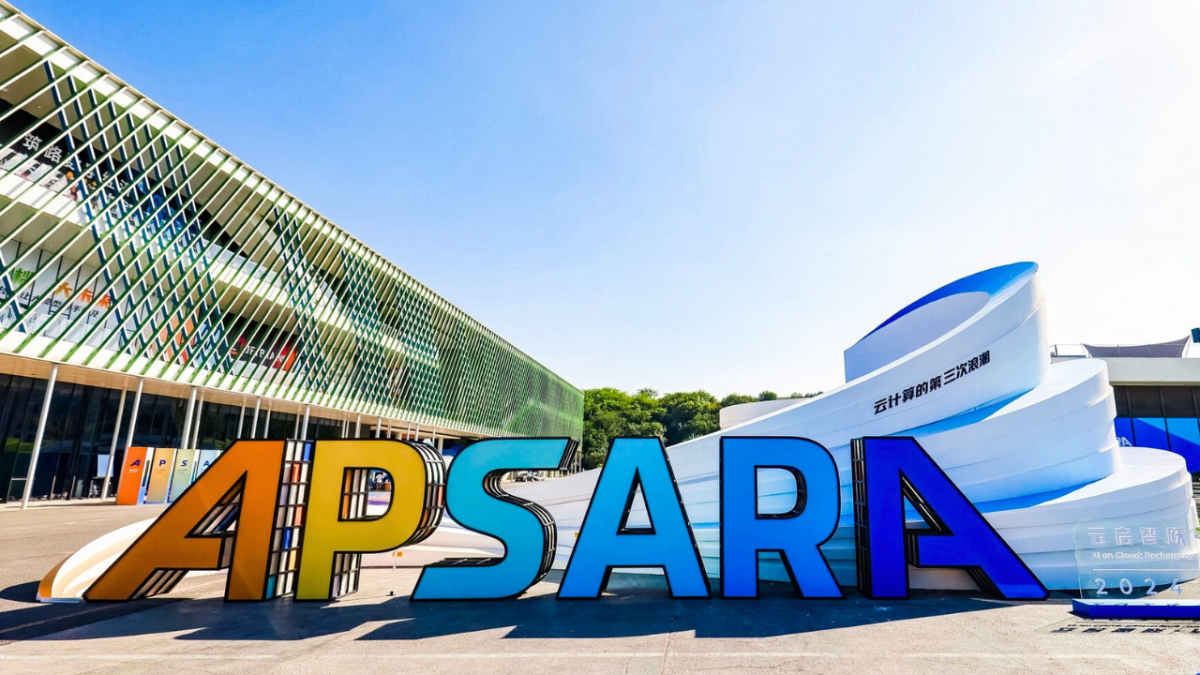
Photo credit: Alibaba Group
Alibaba Cloud wrapped up its annual Apsara Conference on Saturday, showcasing its latest infrastructure enhancements and model updates to accelerate artificial intelligence adoption across industries.
Demand for these solutions is rising rapidly — the cloud computing company’s proprietary foundation model Tongyi recently topped 300,000 customers via its generative AI platform Model Studio, up from 90,0000 users in May.
To see what’s next in the pipeline at Alibaba Cloud, thousands of people attended this year’s Apsara Conference in Hangzhou.
The event featured 400 forums exploring the latest industry trends from autonomous driving to artificial general intelligence. In between sessions, participants were invited to interact with virtual avatars, humanoid robots, and more.
Missed out on the action? Alizila has got your back. We scoured the Apsara exhibitions and panels to bring you the latest innovations from Alibaba Cloud.
Go Big on Opensource
Alibaba Cloud unveiled its most expansive open-source initiative this year by releasing over 100 models under the Qwen 2.5 model family.
The models feature significant improvements in coding, and mathematics capabilities and are able to support over 29 languages, including Chinese, English, French, Spanish and Portuguese. Their sizes range from 0.5 billion parameters up to 72 billion to meet the demand for generative AI on and off the cloud.
The launch also includes specialized models for coding, Qwen2.5-Coder and mathematics, Qwen2.5-Math. The coder model outperforms many larger language models across a range of programming languages and tasks, demonstrating its exceptional coding capabilities. To date, the Qwen models have surpassed 40 million downloads on platforms like Hugging Face and ModelScope.
Go Multimodal
Alibaba Cloud increased its investment into multimodal models with the release of a new text-to-video model under its image generator Tongyi Wanxiang.
The model can generate videos across a wide variety of styles, from realistic scenes to 3D animation, with the potential to support uses cases such as advertising and short film production.
Qwen 2-VL, the latest version of Alibaba Cloud’s vision language model that can comprehend videos lasting over 20 minutes and support video-based question-answering has also been open-sourced. The 2-billion-paramter version of the model, Qwen2-VL-2B is optimized for potential mobile deployment while the 72-billion-parameter version demonstrates a significant edge in document understanding.
Qwen2-VL also demonstrates strong potential as a visual agent, able to facilitate interactions similar to human perceptions. Capable of complex reasoning and decision-making, Qwen2-VL can be integrated with devices like mobile phones and robots for automatic operation based on the visual environment and text instructions.
AI Infrastructure Update
To meet the growing demand for computing power fueled by the AI boom, Alibaba Cloud is also revamping its cloud infrastructure to cater to the generative AI age.
The company launched an updated data center architecture called CUBE DC 5.0, which increases energy and operational efficiency with a set of advanced and proprietary technologies. Alibaba Cloud Open Lake, a new solution that integrates workflows, performance optimization, and robust governance in a single platform, is also introduced to help organizations meet the challenges of managing vast amounts of data in the generative AI age.
Also during Apsara, Alibaba Cloud announced an upgrade of its elastic compute service featuring a 30% increase in search recommendation speed and a 17% improvement in reading and writing queries per second when applying to database products compared to the previous generation.
Accelerated Industry Adoption
Alibaba Cloud rolled out a series of partnership announcements during Apsara as the company supports innovation across a host of industries.
“The most significant opportunity for AI lies beyond smartphone screens; AI will take over the digital realm and transform the physical world,” said Eddie Wu, Chairman and CEO of Alibaba Cloud Intelligence, during a keynote speech at the event.
The company’s LLM Qwen has been tapped by Chinese smart electric vehicle maker XPENG to enhance its AI voice assistant for a more superior smart cockpit experience. Qwen and the Model Studio platform are also supporting Singaporean B2B travel technology provider Atlas as it enhances its digital chatbot to address partner inquiries regarding booking procedures and payment options.
And earlier this summer, Alibaba Cloud’s global infrastructure ensured a smooth roll-out of new game from Shanghai-based video game developer miHoYo, whose urban fantasy role-playing game Zenless Zone Zero received nearly 50 million pre-beta registrations.
AI at the Edge
Alibaba Cloud is bringing the power of generative AI to more consumers through edge AI, which delivers the benefits of cloud AI without needing network connectivity.
As part of the shift to edge AI, Alibaba Cloud unveiled during Apsara its large multimodal model (LMM) solution designed for automotive applications and co-developed with NVIDIA and Banma, Alibaba’s intelligent cockpit solution provider.
Alibaba Cloud’s Qwen models have been seamlessly integrated with the NVIDIA DRIVE AGX Orin platform for autonomous vehicles, enabling a more interactive experience for car owners in China.
The platform’s Mobile Agent, as part of the LMM solution, also enables car owners to perform a wide range of tasks, such as ordering milkshakes through a food delivery app or looking for music clips and videos and playing out in the car to deliver a smooth driving experience for both drivers and passengers.






